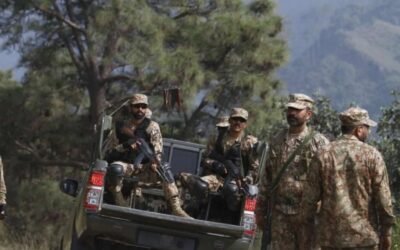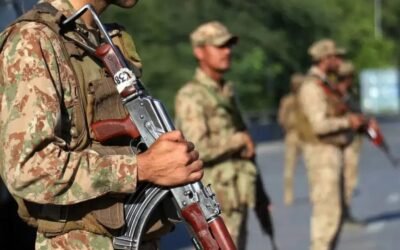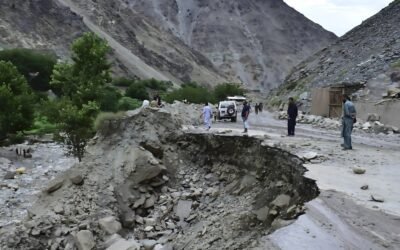The Islamic State–Khorasan Province (ISIS-K) was originally operating in eastern Afghanistan, but it has been increasing its operations in Pakistan over the past years, particularly following the Taliban takeover in Kabul in 2021. The group has conducted lethal attacks against security agencies, religious minorities, and mass gatherings. The most concerning aspect is the increasing power of ISIS-K, which is attracting radicalized youths through online propaganda, and encouraging sectarian violence, especially among the Shia and other minorities. ISIS-K has active cells in Pakistan and recruits militants via urban centers through digital platforms. ISIS-K is an emerging front in the larger terrorism problem that the region is currently dealing with, as it continues to grow in power.
Operations of the ISIS-K in Pakistan
The presence of ISIS-K in Pakistan has continued to increase since 2023, as indicated by its participation in various fatal attacks in various parts of the country. The group has stepped up operations, especially in Khyber Pakhtunkhwa, Balochistan, and Sindh. ISIS-K took responsibility for a suicide bomb attack in a police station in Dera Ismail Khan in December 2023 that killed more than 10 personnel.

Source: Al Jazeera
In February 2024, the group attacked a Shia religious procession in Quetta, killing and injuring dozens of people. In a more recent development in June 2025, ISIS-K militants targeted and killed members of the Shia community in the Orangi Town of Karachi, and this gave rise to the concern that there was a plan for a sectarian campaign in the cities.
ISIS-K employs sleeper cells and frequently cooperates with Fitna-al-Khawarij (FAK) and in Balochistan with the help of Fitna-al-Hindustan (FAH). Such collaborations allow ISIS-K to use the available militant infrastructure, and weapons for their terrorist activities.
The group has also exhibited an increasing urban competence. In March 2025, the Federal Investigation Agency (FIA) of Pakistan announced that it had broken up an ISIS-K-affiliated digital media cell in Lahore, which disseminated extremist videos and organised attacks using encrypted applications. This indicates that ISIS-K is no longer a tribal belt issue, but it is expanding to large cities.
Another worrying trend is advanced communication techniques, which ISIS-K has incorporated, such as dark web forums and encrypted applications, such as Telegram and Rocket. The group takes credit for the attacks via its media wing, Amaq News Agency, which is still operational despite the world trying to shut down the networks. According to a report published by the Global Internet Forum to Counter Terrorism (GIFCT) in 2025, the Urdu-language ISIS-K content was observed to have been sharply rising to target the Pakistani audiences, particularly the youth who felt disillusioned by the economic struggles and political turmoil.
Radicalization of Youth
The fact is that one of the most hazardous elements of the ISIS-K presence in Pakistan is that it is becoming more and more capable of recruiting radicalized youth, particularly in the cities. The group employs modern tools and social media to address frustrated, angry, and vulnerable youth. These youths are usually lonely, unemployed, or frustrated by lack of political stability and injustice. ISIS-K exploits these sentiments by providing these people with a sense of a so-called higher purpose through jihad and sectarian violence—by distorting religious teachings.
ISIS-K propaganda on the Internet is now more local and emotional. As opposed to previous global jihadist communications in Arabic or English, the group now publishes videos, posters, and statements in Urdu and local languages, which allow Pakistani youth to identify with it more easily. They usually contain videos of previous attacks, stories of martyrdom, and ideological lectures that glorify violence against infidels and the propagation of takfiri ideology, i.e., declaring other Muslims as non-believers.
In 2024, a 22-year-old university student in Lahore running a Telegram channel—disseminating ISIS-K propaganda, inciting lone-wolf attacks, and even instructions on how to create homemade explosives—was arrested by security agencies. The same arrests occurred in Peshawar and Rawalpindi, demonstrating that the influence of ISIS-K has not been confined to the madrassas or the tribal regions but is even extending to the mainstream educational institutions.
ISIS-K also focuses on the poor neighborhoods of urban areas, where young men who become frustrated are easy to recruit. These young people are usually uneducated, and their employment opportunities are scarce. Recruiters with ties to ISIS-K were touring such regions disguised as religious study groups and handing out extremist content.
Sectarian Goals, and Violence
One of the most threatening and seminal features of ISIS-K is its sectarian agenda in Pakistan. In contrast to other militant organizations, which mostly focus on the state or the security agencies, ISIS-K encourages sectarian bloodshed, particularly against the Shia Muslims, Sufis, and even moderate Sunni sects such as the Barelvis. They are based on takfirism, which states that everyone who does not believe in their strict version of Islam is a non-believer who should be killed.
ISIS-K-based sectarian attacks in Pakistan have been on the rise in the last two years. In February 2024, a suicide bombing attack in Quetta during a Shia gathering killed at least 38 people. ISIS-K took credit, describing the attack as a cleansing mission against what it described as polytheists. In June 2025, Shia community members were targeted and killed by gunmen suspected to be members of ISIS-K in Karachi, which caused protests and panic among the minority groups.

Source: BBC
The transnational ideology is what makes ISIS-K more dangerous than the older sectarian groups. Whereas the traditional groups were largely concentrated on local sectarian rivalries, ISIS-K considers sectarian war as a global religious war. They do not want to control a single region, but they want to create a pure Islamic caliphate by killing all sects and communities that they consider impure. ISIS-K, urged fighters to cleanse the Muslim land of Shia.

Source: HRW
The sectarian goals of ISIS-K are especially threatening in Pakistan since the nation is religiously diverse. The Shia population accounts for approximately 15-20 percent of the population, and Sufi customs are well established in society. Not only does ISIS-K kill innocent people by encouraging violence against these groups, but it also attempts to separate communities, cause civil unrest, and destabilize the social fabric of the state.
Security Implications in the Region
The rise of ISIS-K in Pakistan poses a significant threat, with far-reaching consequences for neighboring Afghanistan and Iran. ISIS-K has been able to increase its activities since 2021, the Taliban seized control of Afghanistan and used the porous border between the two nations to conduct terror operations.
Though Taliban says it is fighting against ISIS-K, the terror group still operates in/through the provinces of Nangarhar and Kunar and has staged deadly attacks, such as a March 2025 suicide bombing in Balkh Province, which killed more than 30 people. These regions have become the staging grounds of attacks into Pakistan, particularly in KP and Balochistan.
Pakistani authorities have been repeatedly cautioning that the ISIS-K is exploiting Afghan soil to plan and infiltrate across the borders, but the tensions between Islamabad and Kabul have complicated combined efforts. Due to this, there is a wider gap that ISIS-K is exploiting due to the ineffective coordination.
The sectarian violence, perpetrated by ISIS-K, is also a threat to the ties of Pakistan with Iran ties—a majority-Shia neighbor. The repeated attacks by ISIS-K on the Shia processions and Imam Bargahs in cities such as Quetta and Karachi have been a cause of concern in Tehran. Iranian authorities sounded the alarm of possible ISIS-K activity along the Pakistan-Iran border and called on Pakistan to increase security and avoid infiltration.
Moreover, ISIS-K has been posing threats to Central Asian states such as Uzbekistan and Tajikistan via propaganda videos that have been released out of Afghan hideouts, and this has attracted the interest of regional organizations such as the Shanghai Cooperation Organization (SCO). ISIS-K is the most imminent security threat, and mandates increased intelligence sharing and joint counterterrorism activities for its eradication The conflict of Pakistan against ISIS-K is not a separate problem anymore; it is a part of a bigger regional problem that requires cooperation with other states on a serious level.
Conclusion
The increase in the presence of ISIS-K in Pakistan is a grave and developing threat, not only in its lethal attacks, but also in its perilous ideology that aims at the youth and feeds on sectarianism. The group has proven to be flexible and merciless in the way that it recruits disillusioned youths online and executes violent attacks on religious minorities.
Furthermore it has been able to extend its presence in both cities and rural regions because it has the potential to take advantage of lax border security systems, operate on encrypted digital platforms, and establish local networks.
Simultaneously, the operations of ISIS-K are harming the security dynamics in the region, putting a burden on the relationship of Pakistan with Afghanistan, Iran, and the nations of Central Asia. To curb such a threat, Pakistan should have a multi-faceted approach, which should involve improved intelligence exchange, regional partnerships, online surveillance, and grassroots de-radicalization. ISIS-K has the potential to destabilize Pakistan and the region further—if not neutralised through immediate coordinated action.




























